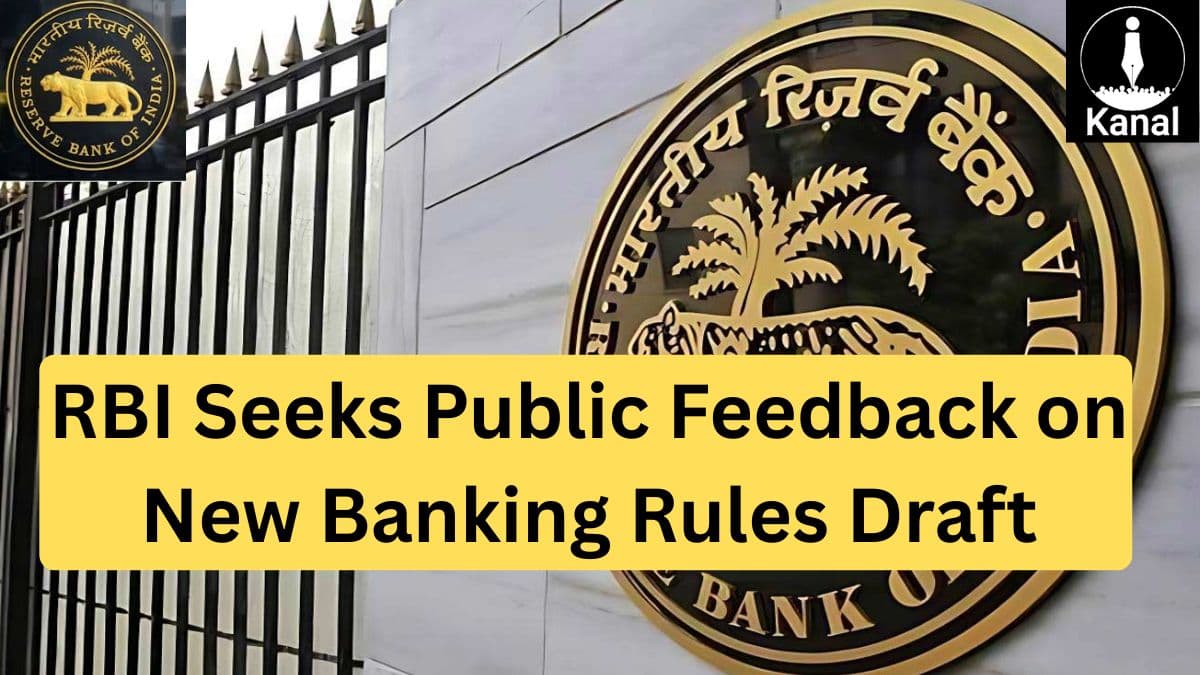RBI Invites Public Suggestions on New Banking Rules Draft Till November 10; Final Norms to be Effective from April 2026
For the first time, RBI has sought public feedback on its consolidated banking regulations. The move aims to simplify and update the framework for all 238 banks. New norms will come into effect from April 2026.

Author: V.Gayathri
Published: October 24, 2025
In a landmark step, the Reserve Bank of India (RBI) has released a draft of comprehensive banking regulations covering 238 banks across the country. According to a report by Dainik Bhaskar, the central bank has invited public suggestions on the draft till November 10, 2025, before finalising the framework. Once approved, the new norms will be implemented from April 2026, ensuring greater transparency and uniformity across India’s banking ecosystem.
One of the most notable proposals focuses on cyber fraud accountability, making banks responsible if customers report fraud within three days.
Major Highlights of the Draft Rules and Their Impact
Advertisement
1. Locker Theft and Insurance
Banks will now be liable in cases of locker theft or damage. Customers may receive higher compensation and better safety assurance.
2. Cheque Settlement Timeframe
The proposed rules reduce cheque clearing time from 15 days to a shorter window, ensuring faster settlements.
3. Cyber Fraud Responsibility
If a customer reports a cyber fraud within three days, the bank will bear full responsibility and refund the amount. Delayed intimation may attract partial liability.
4. KYC Validity Period
KYC updates will now be required every 10 years instead of five, reducing procedural hassle for account holders.
5. Senior Citizen Benefits
For citizens aged 70 and above, doorstep banking services will be made mandatory, improving accessibility.
6. Interest Rate Transparency
Banks will have to make interest rate calculations more transparent, allowing customers to understand rate changes easily.
7. Loan Processing Timelines
Loan sanction and disbursal processes will be streamlined with stricter deadlines to prevent delays.
8. Home Loan Prepayment Rules
Customers prepaying home loans will receive fairer terms with lower penalties or charges.
9. Prepaid and Internet Banking Safety
Banks will need to strengthen security for prepaid wallets and online transactions.
10. Minimum Balance Penalty
The RBI may revise guidelines on maintaining minimum balance to ensure fairness in penalty imposition.
11. Unclaimed Deposits
To address the growing issue of unclaimed funds, RBI will introduce stricter tracking and refund mechanisms.
12. Credit Card Dispute Timeline
Banks must resolve credit card disputes within a fixed period to avoid unnecessary customer stress.
13. Billing Cycles & Payment Updates
Credit card billing cycles may be standardised, with mandatory reminders before due dates.
14. Fee Disclosure Norms
Banks will need to publish clear fee and charge structures across all services for better transparency.
15. Loan-to-Value (LTV) Rules
RBI may fix maximum LTV ratios, ensuring safer lending practices for banks and customers.
16. Digital Loan Guidelines
Digital loans under ₹3 lakh will face new verification norms for borrower safety.
17. Time-Bound Services
RBI may penalise banks for delays beyond prescribed timelines in key customer services.
18. Nomination & Will Integration
Banks will streamline the process for nomination updates and integrate with digital verification systems.
19. Account Closure Rules
Customers will be able to close accounts within a defined time without paying excessive charges.
20. Fixed Deposit Renewal
Automatic renewal processes will be improved to reduce lapses and ensure timely interest credit.
Towards a More Transparent and Accountable Banking Framework
RBI’s proposed regulations mark a significant step toward modernisation and customer-centric banking. By inviting public participation, the central bank aims to ensure that the new framework balances operational efficiency with consumer protection. Once implemented in April 2026, these norms are expected to redefine accountability and transparency standards in India’s banking sector.
Comments
- Ayofhya Kishor Srivastav
Yes. RBI must frame a rule regarding refund of full amount of fraudulent transaction by the bank where victim customer is maintaining acvount incase of cyber fraud, provided the aggrived customer must report the feaud to the concerned bank within 3 days of occurance of fraud and a complaint is filed with the police within seven days by the victim agrieved customer. This rule should be applied in all cases of cyber frauds happened before the date of publication of this rule and even afterwards.
Posted on October 26, 2025
